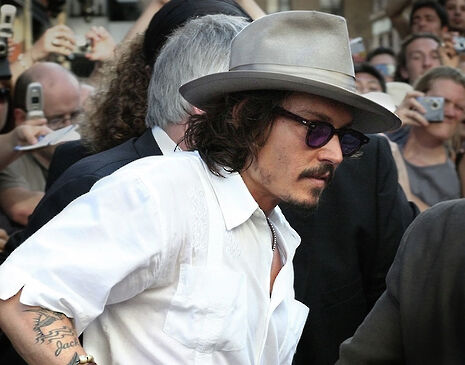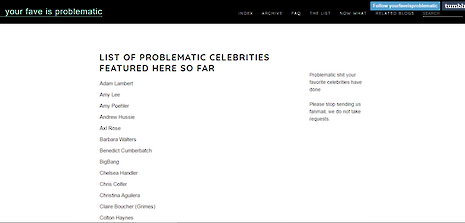Pop culture tells us we know celebrities. But what do we do when things turn sour?
This year is proof that our idols can turn out to be monsters. We have to learn to be OK with that, argues Ian Wang

Recently, my mum and I went to watch Fantastic Beasts and Where to Find Them, J.K. Rowling’s acclaimed return to the Harry Potter universe. Like many people of my generation, the Harry Potter films formed much of the backdrop to my childhood, and I enjoyed seeing what they could come up with for this new series. Except for one part – without giving too much away, a major character makes a cameo towards the end of the film, played by Johnny Depp.
For those out of the loop, earlier this year Johnny Depp’s now-ex-wife Amber Heard filed for divorce, citing irreconcilable differences, and alleging physical and emotional abuse at the hands of Depp. Photos surfaced of her injuries, video footage of Depp’s arguably aggressive and unstable behaviour, text messages suggesting the alleged abuse had been taking place for years, and several witnesses. Heard was granted a restraining order against Depp and, contrary to suggestions that she was just making it all up for the money, she donated the entirety of her divorce settlement to a domestic violence charity.
Obviously, I can’t say that Depp is guilty of abuse. Since Heard declined to pursue criminal charges, we’ll never know if he’d be convicted by a jury, and there’s a point to be made about celebrity media’s eagerness to exploit scandal and villainise people before we know the details. Still, I couldn’t help but feel uneasy knowing that the Potter franchise, which has always promoted love and kindness over hatred and violence, was now giving such a prominent role to someone whose alleged behaviour suggests the exact opposite of those ideals.
And Depp isn’t the first celebrity to be embroiled in scandal in 2016: earlier this year, Hollywood icon Brad Pitt was investigated for alleged child abuse, and Glee star Mark Salling was charged with possession of child pornography. More recently, Oscar hopefuls Nate Parker and Casey Affleck have raised controversy over previous allegations of rape and sexual harassment respectively. Scandals like these are a dime a dozen, and chances are that you’re a fan of somebody who, if not guilty of outright cruelty, has at least engaged in some pretty unsavoury behaviour. There are even entire websites, such as the Tumblr blog 'Your Fave Is Problematic', dedicated to exposing celebrity misdeeds.

Revelations like these are never easy to swallow. As shallow as celebrity culture might be, the emotional connections we form with our idols are real and often deeply meaningful. It’s the reason we watch them on talk shows or follow them on social media. We might look up to them as role models. We might’ve used their songs or movies to get us through a rough patch in our lives. These kinds of one-sided emotional bonds have actually been studied as a psychological phenomenon for decades – they’re called parasocial interactions – and to some people they’re incredibly important.
When we hear, then, that our favourite celebrity may have done something deeply immoral, it can be difficult to reconcile that fact with the image of them that we have in our heads. It can feel like they’ve let us down – betrayed us, even – and it tarnishes all the emotional associations we have with that celebrity. It makes you wonder, if even the people I admire the most can let me down, then what can I rely on?
Mainstream celebrity culture, unfortunately, doesn’t have the answer. In fact, it seems the attitude of most celebrity media outlets is simply to forgive and forget. Chris Brown, for example, had the entire weight of celebrity media upon him in 2009 when he pled guilty to assaulting his then-girlfriend Rihanna. The firestorm of controversy that followed made it seem like Brown could never succeed in the music industry again. Two short years later, he had his first number 1 album and won a Grammy, with hardly a peep from the same news outlets that were supposedly so disgusted with him in 2009.
Is the solution to do the exact opposite, then? Instead of ignoring the immoral actions of celebrities, should we be condemning, boycotting, protesting them? That seems like the most ethical option, but it’s also pretty unrealistic. Let’s go back to Depp – can people really be expected to boycott all five Fantastic Beasts films because of his involvement? To boycott any new film starring Depp, or any other actor accused of wrongdoing for that matter? You’d have to avoid half the new films being released.
Perhaps soapboxing and boycotts aren’t the answer, then, but either way it seems like we need to re-evaluate the way we view celebrities. Whether or not we want to admit it, if stars are just like us, then they are just as flawed as us too, and as long as social problems like domestic violence are prevalent in our society, we can’t pretend that celebrities aren’t guilty of perpetuating them as well. Parasocial interactions are powerful psychological forces, but it’s important to remember that, no matter how much it seems like it, we don’t truly know our idols: that actually, they aren’t our friends, and we can’t always be shocked if it turns out that they’re horrible people. We have to recognise that celebrities are human too – for better, or for worse
 News / Right-wing billionaire Peter Thiel gives ‘antichrist’ lecture in Cambridge6 February 2026
News / Right-wing billionaire Peter Thiel gives ‘antichrist’ lecture in Cambridge6 February 2026 News / Man pleads guility to arson at Catz8 February 2026
News / Man pleads guility to arson at Catz8 February 2026 News / Cambridge students uncover possible execution pit9 February 2026
News / Cambridge students uncover possible execution pit9 February 2026 News / Epstein contacted Cambridge academics about research funding6 February 2026
News / Epstein contacted Cambridge academics about research funding6 February 2026 News / John’s duped into £10m overspend6 February 2026
News / John’s duped into £10m overspend6 February 2026








